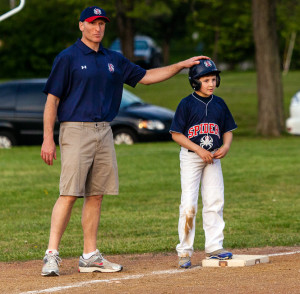The Profound Parenting Lesson I Learned From Little League.
I love Little League. I love the smells coming from the “snack shack”, the drama of the overly competitive parents and the occasional flashes of genius from the “little leaguers” themselves. My son Jesse was only 8 this past season, but he is already autographing baseballs for practice;)
Recently, the world watched as Maine-Endwell of Upstate NY took down the incredible challenger, South Korea, for the Little League World Series. A small town of 10,000 beat a city of 10 million. It was a series for the ages.
While our boys and I were watching the game, it reminded me of a profound lesson I learned this year as I watched my youngest son’s playoff game.
What Jesse’s team lacked in skill, they made up for in heart. It was the first round of the playoffs and his team was playing an opponent that, to be honest with you, they had no business being on the field with, let alone having any chance of beating.
By some act of God, Jesse’s team found themselves tied going into the bottom of the last inning. We were looking at the come back of the season until…
In the bottom of the 6th, the opposing team had the bases loaded with two outs and a great hitter up to the plate. Sure enough, the kid hit the ball and his teammate on third base came sprinting home to a play to very close play at the plate. As the kid slid home, we all knew he just beat the throw and was under the tag.
Yet, to our amazement, the umpire called him, “OUT!”
I was shocked. How could he be out?
What I, and probably every other coach, parent and fan also missed, was that the third base coach slightly nudged his player to remind him to run.

The kid temporarily froze like a deer in the headlights. He forgot to get moving and his coach gave his the slightest nudge of encouragement to high tail it home.
Innocent enough, right? Nope.
The rule is that a coach cannot touch any of his players on the field of play or the player will be called “out” for “coach interference.”
The coach who made this mistake was one of the finest coaches in the league. His team was an excellent team of ballplayers, largely in part to his coaching.
But what he thought would help his player, actually hurt his team.
Our team miraculously scored ten runs in the extra inning. They shockingly took advantage of their narrow window and beat this superior team.
“Coach interference” cost that team the game.
They could’ve won.
They should’ve won.
But they didn’t walk away with the victory.
The coach’s momentary lapse in judgment cost his team the playoff game.
The whole incident got me thinking about parenting; about my parenting.
[Tweet "Our attempts to help our child's short-term performance actually hurts their long-term development."]
So many parents fall into the temptation of doing “everything” for their kids, instead of letting them struggle, fail and learn on their own.
I’ve been guilty of this for sure.
When one generation of well intentioned parents, tries to give their children every advantage, privilege and assistance they were not provided, the result is not always good.
This issue is so common that they have a name for this parental defect! It’s called “helicopter parenting”.
Parents who hover over their kids to help protect them from ever making a mistake become part of this ever-growing fraternity. And we wonder why the number of young adult children returning to live at home after college has more than doubled in the past two decades.
“Helicopter parents create boomerang kids”-Dr. Tim Elmore
There are clearly more factors contributing to this complex social issue. But “coach-interference-helicopter-parenting” is certainly not helping the problem.
It’s pretty sobering to think that if we never let our kids skin their knees, they may never learn to persevere in life when the stakes get so much higher.
If we shelter our children from everything that is “hard” in life, how can we be upset with them when they seem to be overly “fragile” or “entitled”?
Parents, pastors, teachers, employers, and managers…we can all be guilty of this.
It’s instinctual.
As a parent and leader here are a few reminders that have been helping me:
- I can do something with you but I can't do something for you. –Dr. Phil McGraw
- There is a difference between training and development. Training is about skill for a task. Development is about growth in a person. –Dan Reiland
- If you delegate tasks, you create dependent followers. If you delegate authority, you create empowered leaders. –Craig Groeschel
Parenting and leadership is an art, not a science.
It’s also not for the faint of heart.
The next time you are tempted to jump in and “help” your child, staff member or teammate, I hope this “coach interference” story will come to mind and serve you well.
We are in this together. I’d love to hear your thoughts.
Join the Conversation. Leave a Comment.
What has helped you deal with your “helicopter” tendencies in parenting or leadership?
